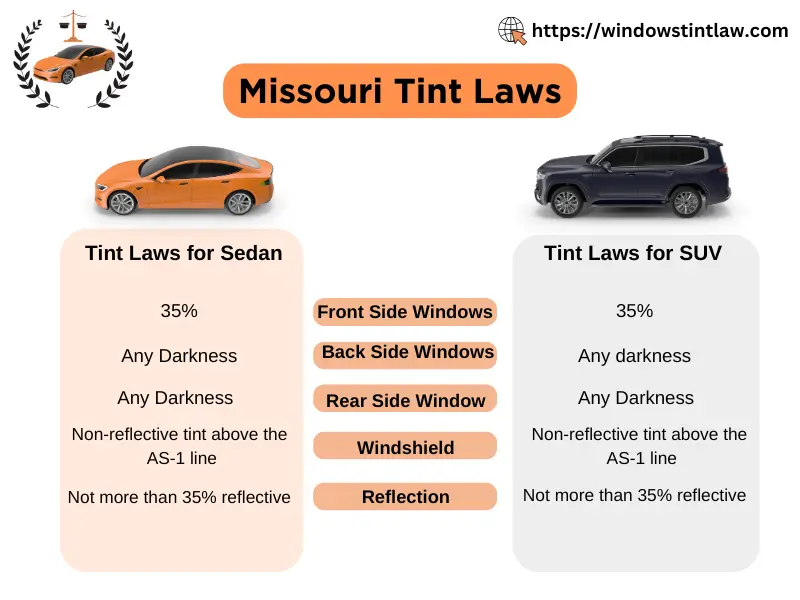Missouri Tint laws were legislated in 2002 to regulate legal window tinting for vehicles operating on roads and highways. Illegall tinted windows can cause injury to drivers and passengers since they significantly impair the driver’s vision.
Tinted windows provide numerous benefits, including increased privacy and the blocking of harmful UV rays; yet, noncompliance with state rules may result in legal consequences for the driver.
According to Missouri window Tinting laws the coating materials must not have solar reflectance of 35% or more. Hence drivers are advised to make the right choice while selecting the tinting material types.
Overview of Missouri Tint Laws
The below infographics outlines the legal tint limits for Cars and SUVs operated in Missouri. Vehicle owners and drivers must follow these rules to avoid tint tickets.

Darkest Legal Tint in Missouri
The table below provides the allowed tint darkness and reflection limits for vehicles operated in Missouri. The state has no specific restrictions on tint colors. Drivers and vehicle owners of Cars and SUVs or MPVs must follow these guidelines to avoid penalties.
| State | Front Side Windows | Back Side Windows | Rear Windows | Windshield | Tint Reflection | Color Tints |
| Missouri | 35% | Tint of any VLT % can be applied. | Tint of any VLT % can be applied. | Non Reflective Tint above the AS1 line. | Not more than 35% Reflective. | No tint colors are specifically restricted. |
Window Tint Reflection
According to updated Missouri Statutes for Motor Vehicle Equipment, No motor vehicle should apply tinting materials with a solar reflectance of 35% or higher with plus minus 3 percent tolerance. Moreover, The same law applies to cars, SUVs, and multi-purpose vehicles.
Other Rules and Regulations
There are some other rules for motor vehicles with tinted windows operating in Missouri State, which are listed as below:
- Dual Side Mirrors: Dual side mirrors are required if the rear window of vehicle is tinted.
- Restricted Tint Colors: No tint colors are specifically restricted.
- Certificates: Window Film Manufacturers do not need to get certification of the tinting materials they sell in the state.
- Sticker or Label: Sticker or label to identify the legal tint is not required to display on the window glass.
Medical Exemption
Missouri window tinting laws permits to install lower tint due to certain medical conditions. A medical exemption certificate can be given if a licensed physician in the state prescribes that the person requires to avoid direct sunlight. The permit allows to install sun screening materials with less light transmittance and luminous reflectance than the allowed limits.
Furthermore, The permit allows operation of the motor vehicle by second degree relatives which means spouse, grand parents, parent, brother , sister, niece, nephew, aunt and child who resides in the household.
Lastly, Any kind of sun screening or tinting material cannot be applied on the front windshield which obstructs the driver’s clear view of the road.
Penalties for Violating Tint Laws
Anyone who violates Missouri’s window tinting restrictions is guilty of a “Class C misdemeanor”. If the police suspect illegal tinting, they may stop the vehicle and test the tinted windows with a tint meter; if illegal tinting is discovered, a tint penalty will be issued. The first offense may cost $75, while subsequent offenses will result in a higher monetary fines.
After all, Drivers can avoid tint tickets by adhering to the state’s window tinting regulations, as repeat infractions can result in serious legal consequences, and window tinting is not worth it.
